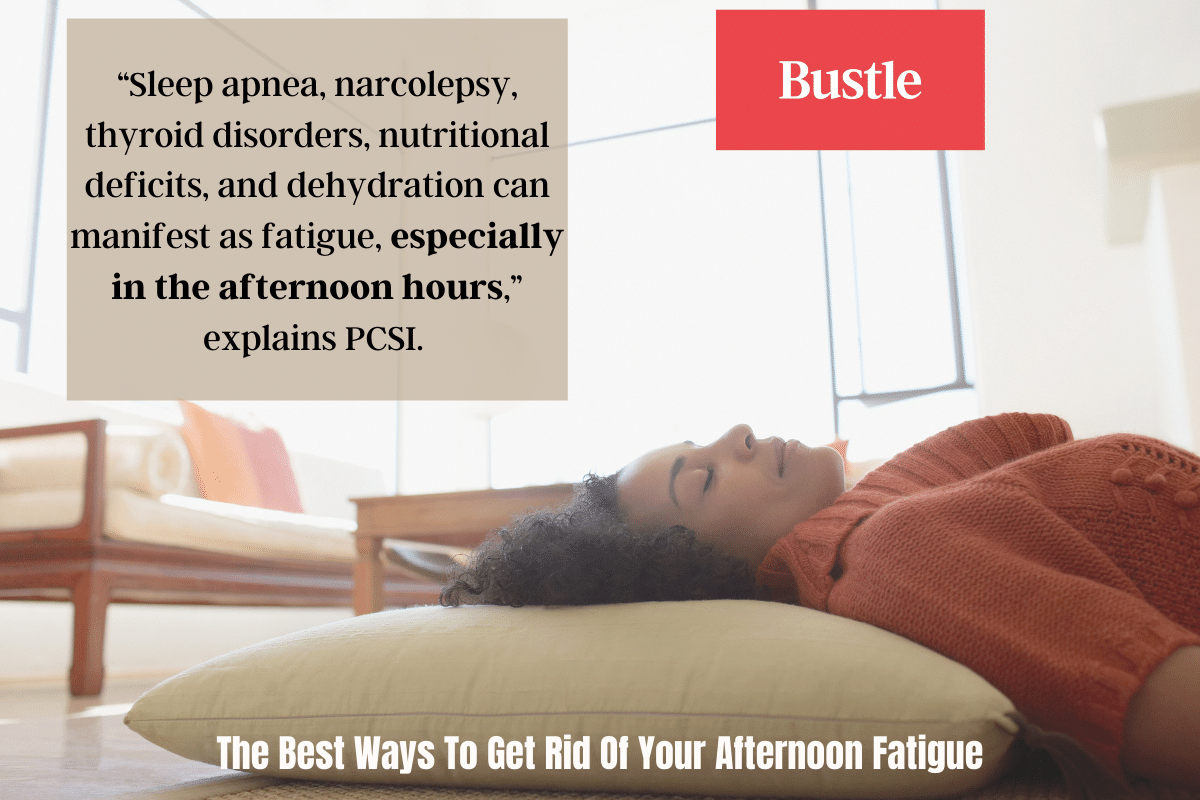
13 Sep The Best Ways To Get Rid Of Your Afternoon Fatigue
You went to bed early, had a pretty good sleep, and even — gasp! — didn’t feel the need for a second cup of coffee this morning. But come 3 p.m., all you can think about is the fact that you’re sitting at your desk instead of lying in your bed. When a case of midday exhaustion hits you harder than that kiss in the beginning of The L Word: Generation Q Season 2, curing your afternoon fatigue becomes the most important thing on your to-do list.
Why Do You Get Tired In The Afternoon?
Even if you were wide-eyed and ready for the day a few hours ago, that mid-afternoon crashcan hit hard. “Several different factors can play a role in afternoon fatigue,” says Dr. Vivek Cherian, M.D., an internal medicine physician affiliated with the University of Maryland Health System. It may be anything from your sleeping habits to your lunch schedule.
You might feel like you slept well, but Dr. Cherian says it’s possible that you’re not sleeping enough to prevent a midday crash. “Even if you get a good night’s sleep, you may average less than seven to eight hours per night and may overall be in sleep debt,” he explains.
When you’re already prone to being tired, caffeine might also start playing a role, Dr. Cherian tells Bustle. “If you’re a big coffee drinker, as the caffeine tends to wear out of your system, you may experience a ‘caffeine crash’ and feel extremely tired,” he says. “There is a reason why a lot of coffee drinkers not only drink coffee in the morning, but also throughout the day to essentially avoid this crash.” But the caffeine might be precipitating the crash if it’s preventing you from getting a full seven or eight hours of shut eye each night.
When you have lunch might also play a role, Dr. Cherian says. A big lunch can make you tired as your body works to digest all that food. The same goes for your workout schedule. “If you have an intense workout in the morning, that can lead to an afternoon crash, particularly if you are new to working out,” he explains. “That being said, however, in general (especially when you get into the swing of things), regular exercise increases your energy levels and actually can combat fatigue.”
You might want to check in with your doctor if your midday exhaustion becomes a pattern, says Dr. Luis Javier Peña-Hernández, M.D., F.C.C.P., a lung health specialist at the Pulmonary, Critical Care and Sleep Disorders Institute(PSCI) in Florida. “Sleep apnea, narcolepsy, thyroid disorders, nutritional deficits, and dehydration can manifest as fatigue, especially in the afternoon hours,” he explains. If you’re noticing yourself losing your energy more afternoons than not over the course of a couple of weeks, it might be time to hit up a health provider.
How Can You Prevent Afternoon Exhaustion?
Preventing afternoon fatigue looks like a lot of little habits that can add up to a big change in energy. “Going to bed on a regular schedule, exercising in the morning hours, and monitoring caffeine intake in the afternoon hours” can all help prevent you from falling asleep on the job, Dr. Peña-Hernández tells Bustle.
Another thing that will probably help — good old fashioned water. “A factor that people don’t think about is that often they may be dehydrated to a degree,” Dr. Cherian says. “Try drinking water regularly for a week or so and you will be amazed at how your overall energy level will increase.”
It helps to observe your patterns for a while to try to isolate what’s happening for your body, Dr. Cherian says. Are you more likely to want to pass out after your noon meeting if you had a second cup of coffee? If you had a big lunch? Once you can isolate what might be happening for you, make a reminder to yourself to eat breakfast and then snacks, or set that alarm to help you work out in the morning — whatever seems like it’ll help prevent your midday fatigue.
How Do You Recover From An Afternoon Crash?
Sometimes, all the sleep hygiene in the world can’t save you from a case of the midday sleepies. Try to resist the pull of that Americano if caffeine is your first instinct, Dr. Peña-Hernández advises. That afternoon espresso might crack your eyes back open now, but if it disrupts your sleep tonight, you’ll likely find yourself back in the same sleepy position during tomorrow’s afternoon meeting too. Instead, opt for some water.
You also might want to go for a walk outside. The physical movement will get your blood flowing, and the sunlight can help wake up your mind. Then, focus on your prevention strategies so you can avoid future bouts of afternoon lethargy.
Experts:
Dr. Luis Javier Peña-Hernández, M.D., F.C.C.P., Pulmonary, Critical Care and Sleep Disorders Institute(PSCI)


Sorry, the comment form is closed at this time.